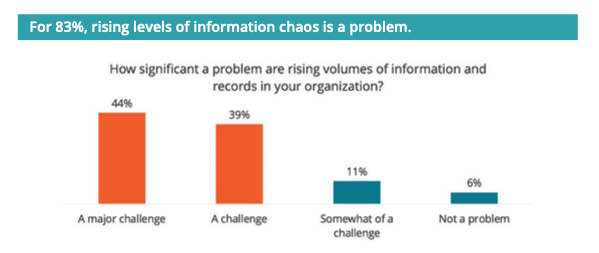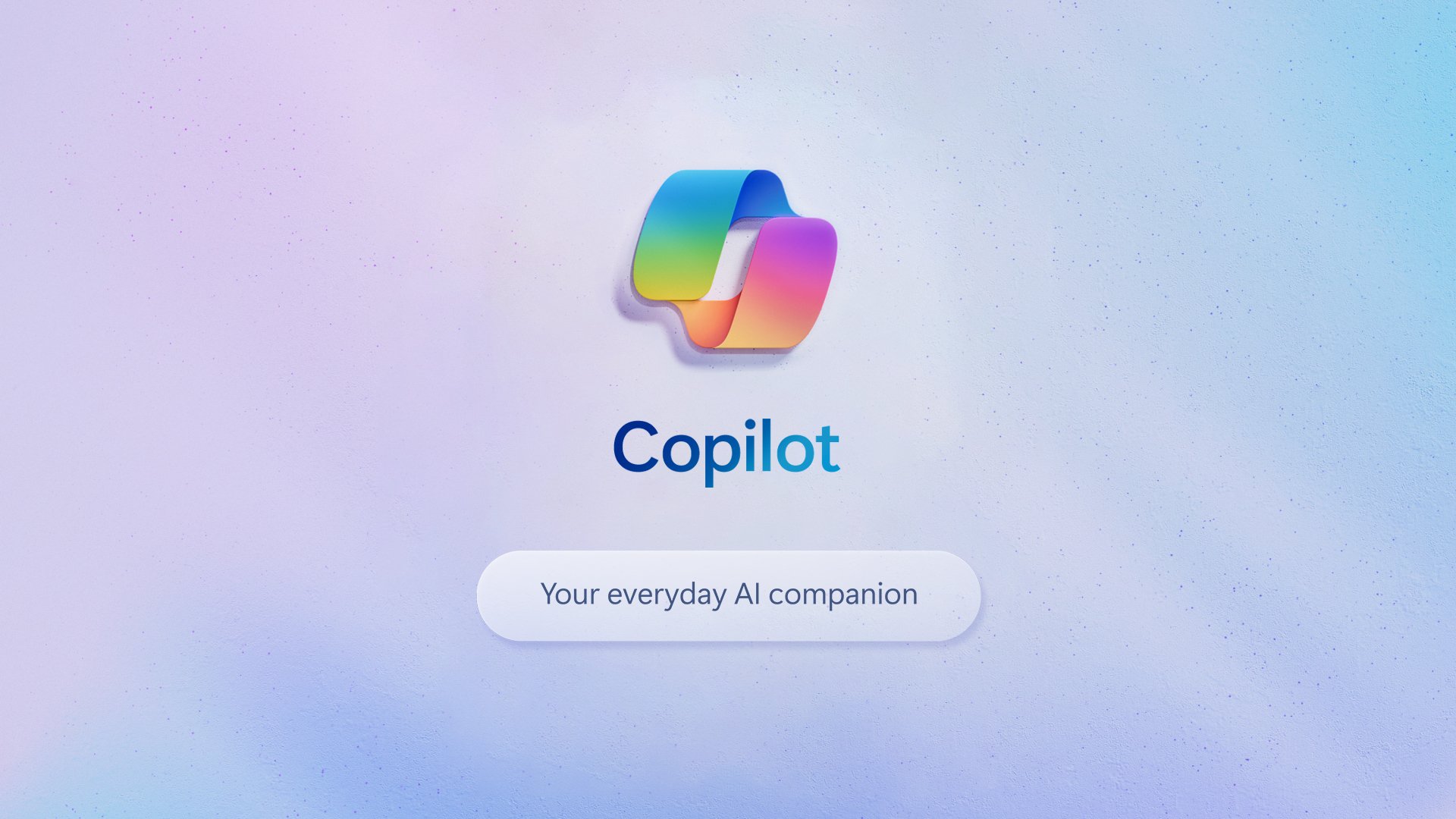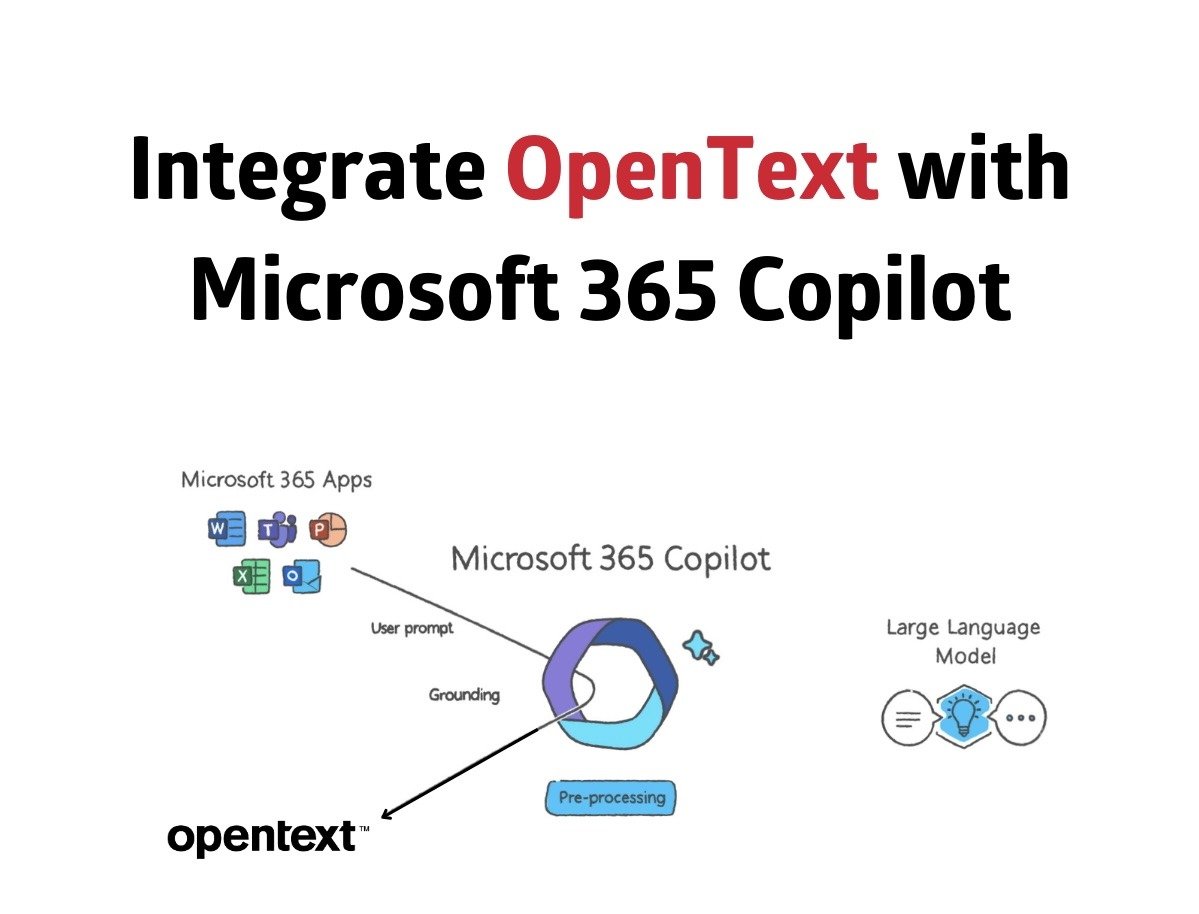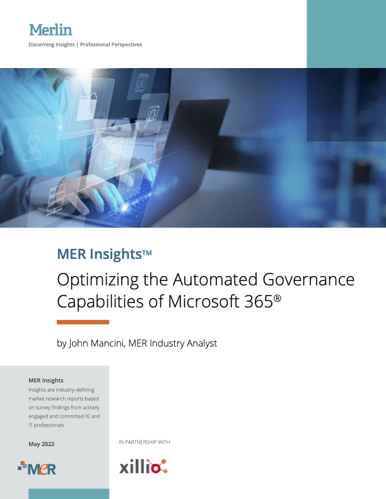Microsoft 365 and information governance – findings of the MER report
Merlin, led by former President of AIIM John Mancini, just issued its quarterly report on information governance, focusing on governance within the Microsoft 365 platform. 200 organizations from across industries, mainly from North America, were surveyed about their views on how to deal with information governance and their experiences in adopting Microsoft 365.
In this blog, we have summarized some key findings from the report that are particularly interesting. If you're interested in the full report, feel free to download and share it.
- The context for Microsoft 365 automated governance and compliance is that of a rising tide of information chaos.
83% of respondents indicate the rising level of information and records poses a problem – one respondent said it is the gain in awareness of an already existing problem. Also, it is recognized that content, as the largest type of information, requires a different approach regarding governance than data.
- The alignment of business, information governance, and Microsoft 365 governance strategies is increasingly critical - but is sorely lacking in most organizations.
Business, information governance, and Microsoft 365 strategies are severely lacking alignment, creating process and information quality and efficiency problems.
- The pace of change in Microsoft 365 is a significant challenge; effective change management is more important than ever before.
The pace of the move of information and workloads to the cloud has been increasing and with the COVID-driven adoption of the Microsoft 365 platform soaring, organizations struggle to adopt and appropriately apply governance methods and functions. Change management is seen as a critical need for a Successful use of the platform.
- Microsoft 365 automated governance and compliance adoption are still in the early stages; most users have not caught up with the capabilities of the platform.
Most users of the Microsoft 365 platform are not aware of the functionality they can access and use for information governance purposes, sometimes slowing down or even blocking a purposeful move toward the platform.
 Copyright 2022, MER Conference, Optimizing the Automated Governance Capabilities of Microsoft 365.
Copyright 2022, MER Conference, Optimizing the Automated Governance Capabilities of Microsoft 365.
Expert panel's recommendations for the survey results
- Flexibility
Any large-scale migration should be backed up by a cost-benefit analysis, and your migration budget needs to be put where it counts most.
- Start with the obvious
Shared drives are the most likely starting point for getting rid of your legacy content repositories that need better governance. Next, look at the legacy platforms that cost you the most and would require a lot of effort to upgrade.
- Test everything
Make sure you test the target platform thoroughly before committing and utilize proofs-of-concept to understand the essence of migrating before crossing over.
- Proceed at your own pace
Adoption of the Microsoft 365 platform should be measured and phased. Start with the basics, make content findable first, then add automation. Make sure governance is part of your day 1 strategy.
- Commit to staying current
Stay on top of the Microsoft 365 roadmap. The platform is evolving at a very rapid pace and you have to actively make yourself familiar with the latest and greatest to decide what will benefit your organization most – and promote it internally.
- Think about HOW you will make decisions
Create a roadmap of items that need to be decided upon and prioritized and construct the team that will decide about it. Typically Business, IT/Governance, and Compliance reps should be part of it.
- Learn from others who have been there
Build your industry network and join the community to reap the benefits of earlier experience. You are definitely not alone, actually far from.
- Selectively use external advice
Make effective use of experts that have hands-on experience and can both actually guide you and/or give a second opinion. Do not make them part of your permanent staff, use them to teach you the how-to.
- Get a seat at the table
Make sure your stake is represented during discussions on information governance, the role of Microsoft 365, and the governance structure needed for it.
- Start with processes and people
Lok at the core business process that would benefit most from the new platform. Improve processes using proofs-of concepts and pilots, and actively support the people adopting new ways of working. People and processes are key to the successful adoption of the platform.
- Think big
Microsoft 365 is a huge thing and it makes sense to discuss where it can solve already identified problems that could be a fit-for-purpose – focus on these first, solve them, and the reputation of the platform will rise instantly.
- Just do it
Be bold, be brave, and just get started taking the above in mind. The out-of-the-box capabilities of the platform are powerful enough to make a difference. Gradually introduce the support of more advanced use cases.
What's your next step?
From our personal experience, making the initial step of moving critical business content to Microsoft 365 is the hardest, and requires the help of experts who have done it before successfully
Xillio sponsored the survey and report. Xillio’s mission is to enable organizations to create a future-proof content migration strategy that aligns core information management principles - security, searchability, governance, and compliance – with user-centricity, adaptability, and business value. With 20+ years of experience in ECM migrations, Xillio is an industry leader in helping organizations plan and execute a successful Microsoft 365 content strategy. Xillio can help you size up the full impact of any migration towards Microsoft 365 in terms of costs and benefits, having successfully supported this type of transformation for many major and smaller organizations and companies across the globe.
Once given the green light, we leverage our content migration experience to take the headache out of your move and make sure you can reap the benefits of the Microsoft 365 platform in the shortest possible timeframe at an affordable cost. We use our proven migration method and proprietary migration platform, run by highly experienced migration engineers, to guarantee your success. Want to know more? Get in touch today!
Findings and recommendations are summarized from the report 'Optimizing the Automated Governance Capabilities of Microsoft 365', MER Conference.
Share this
Previous story
← Content Management State of Affairs
Next story
Content Consolidation into Microsoft 365 →
You May Also Like
These Related Stories
Microsoft Copilot: the future of business is here


Microsoft Copilot: the future of business is here
Nov 17, 2023 10:21:13 AM
3
min read
5 Best Practices for a Compliant Migration to Microsoft 365


5 Best Practices for a Compliant Migration to Microsoft 365
Feb 3, 2022 3:01:15 PM
3
min read
Integrate OpenText Content Server with Microsoft 365 Copilot


Integrate OpenText Content Server with Microsoft 365 Copilot
Jul 30, 2024 2:01:35 PM
2
min read


No Comments Yet
Let us know what you think